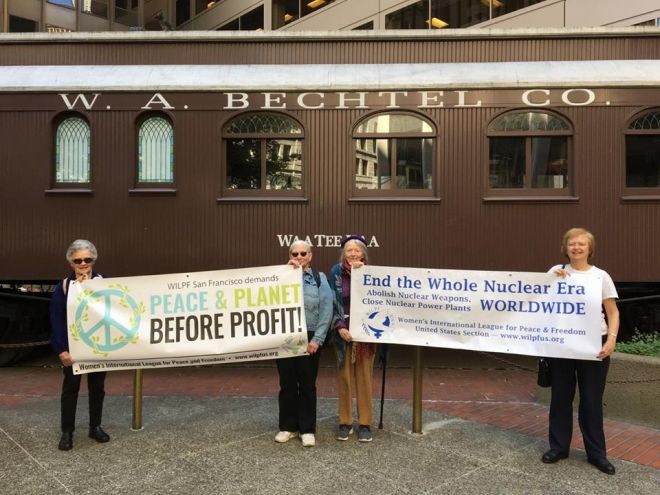This Earth Day, “Ask the Candidates” about Their Vision
Published on April, 10 2019
On World Water Day in 2017, San Francisco-East Bay Branch members stand in front of the former Bechtel Corporation headquarters in San Francisco. From left: Anne Politeo, Barbara Blong, Deetje Boler, and Betty Traynor. Bechtel, a private corporation, “serve[s] the Infrastructure; Nuclear, Security & Environmental; Oil, Gas & Chemicals; and Mining & Metals markets.” Photo credit: Elena Rogan.
By Nancy Price
Earth Democracy
Are we moving toward realizing the promise of Earth Day and Martin Luther King’s called-for “revolution of values”? Now’s the time to “Ask the Candidates” to support policies to bring us full circle toward realizing the visions of Senator Gaylord Nelson and Martin Luther King.
We have a handout available for tabling at your Earth Day solidarity event, or whatever event you will be participating in. It fits on one 8 ½ x 11 double-sided page; please download and print out.
What follows are the opening paragraphs of this handout, which gives historical overviews of the founding of Earth Day, Martin Luther King’s call for a “revolution of values,” and the Lewis Powell memo, one of the key events which led to the business elite becoming an ever-increasingly powerful force in US politics.
The Founding of Earth Day
Over the 1960s, environmental and anti-war activists began thinking they’d had enough of corporate environmental disasters—Love Canal (1953), the consequence of indiscriminate spraying of DDT revealed by Rachel Carson in Silent Spring (1962), assassinations (President Kennedy, Malcom X, Martin Luther King, Jr., and Robert Kennedy), the violence of the Chicago convention and escalation of the Vietnam war with carpet-bombing, Agent Orange, the My Lai atrocity, and expansion into Cambodia.
In 1969, two iconic disasters galvanized the public and legislators into action: In Ohio, the alarming fire on the Cuyahoga River in downtown Cleveland, and in California, the huge Santa Barbara Channel oil spill, at that time the largest oil “blowout” in U.S. waters that covered 30 miles of sandy beaches and significantly affected marine life.
It was no surprise, then, that when Wisconsin Senator Gaylord Nelson proposed Earth Day for April 22, 1970, 20 million people turned out to peacefully demonstrate.
In quick succession, Congress under President Nixon created the Environmental Protection Agency (1970) and passed the Clean Air (1970), Clean Water (1972) and Endangered Species (1973) Acts. These all had precursors in the1960s when municipal and state governments, as well as Congress, alarmed by increasing illegal dumping of toxic waste and air, land and water pollution had passed laws to limit corporate harm to public health and ecosystems.
Martin Luther King’s “Revolution of Values”
On this first 1970 Earth Day, Sen. Nelson expressed his hope to “build bridges between man and nature’s systems, instead of more highways and dams and new weapon systems that escalate the arms race.”
Indeed, Nelson seemed to echo Martin Luther King, Jr’s revolutionary 1967 speech “Beyond Vietnam: A Time to Break Silence” when King moved dramatically from civil rights to a critique of capitalism and war, calling for a “revolution of values”—a shift from a “thing-oriented" society to a “person-oriented” society.
He expanded on his “dream” to describe his vision of “a worldwide fellowship that lifts neighborly concern beyond one’s tribe, race, class, and nation,” saying: “when machines and computers, profit motives and property rights are considered more important than people, the giant triplets of racism, extreme materialism, and militarism are incapable of being conquered.”
Nelson remarked that the “change” he and King before him envisioned called for “new standards for progress, emphasizing human dignity and well-being rather than an endless parade of technology that produces more gadgets, more waste and more pollution.”
Share your Earth Day activities and direct any questions to: nancytprice39@gmail.com.



